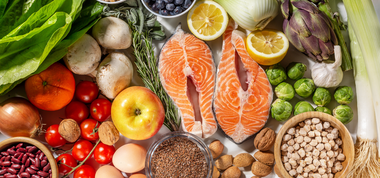More Dietary Guidelines and More Confusion
The 2015 Dietary Guidelines were just announced and they’re already stirring controversy. Lawsuits claiming food industry influence, even. Mostly because they have helped generate headlines such as these: “Concerned about the cholesterol and fat in your diet? That’s so last year.”
Read that without delving into the details of the recommendations and you might walk away thinking that gorging on meat and eggs is just fine now. And, to be perfectly honest, the guidelines don’t take a very strong stance on such matters. That’s really unfortunate, because the last thing we need is more confusion about what to eat.
Especially when the data is consistent and voluminous–a diet rich in vegetables, fruits, nuts and seeds, beans and greens and all grains in their most whole and unprocessed forms.
So which parts of the new guidelines are most confusing?
Fat. When the guidelines talk about worrying less about fat, they’re not saying you should continue eating burgers and fries. They’re referring to unsaturated fat which is liquid at room temperature and comes primarily from whole plants – the oils in nuts and seeds, the oils in fish and the oils in olives and avocados.
Cholesterol. And when they talk about not worrying about cholesterol, they’re not saying you now get to eat lobster drenched in butter or a 16 ounce piece of steak. They mean that judging food on cholesterol content is not all that useful for controlling blood cholesterol levels. A cholesterol-free Twinkie is still not a healthy choice and will hurt, not improve, your cholesterol numbers.
Most important?
Limit added sugars. Keep your intake of added sugars to 10% of your daily calories. If you eat a 2000 calorie diet, that translates in 12 teaspoons of sugar per day. If you drink a can of regular soda, you just used up your daily allotment.
But following this advice can be difficult because current nutrition labels list sugar as one category, making it impossible to determine how much is naturally occurring–like the sugar in fruit– and how much is added–like the sugar found in candy.
From a health perspective this is a critical distinction. Naturally occurring sugars as part of whole foods have decades of research showing them to be safe, while added sugars have consistently been linked to obesity, diabetes, high cholesterol and heart disease.
The answer lies in the ingredient list, not the nutrition panel. But food manufacturers have started splitting added sugars. That means, they add sugar in a variety of forms. That serves to move all that sugar from the top of the ingredient list, and to make it harder to spot.
So what should you do?
Stay with what you know. An eating plan based on real foods in their most natural form has always been–and remains-the best approach. And that’s how we make Step One Foods. Whole food ingredients backed by science.

Tested & Proven Results.
- Cardiologist formulated
- Supported by over 500 publications
- Clinically-proven, in a double-blind randomized trial with Mayo Clinic and The University of Manitoba
80% of participants lowered their cholesterol in just 30 days. With just two servings per day, Step One Foods offers a proven-effective way to naturally lower LDL (bad) cholesterol.
Get heart health tips and articles like this, delivered right to your email.
New articles every week.
You may also like...

How the Mediterranean Diet Protects Your Brain as You Age

You don’t need to avoid foods with cholesterol…except for these



